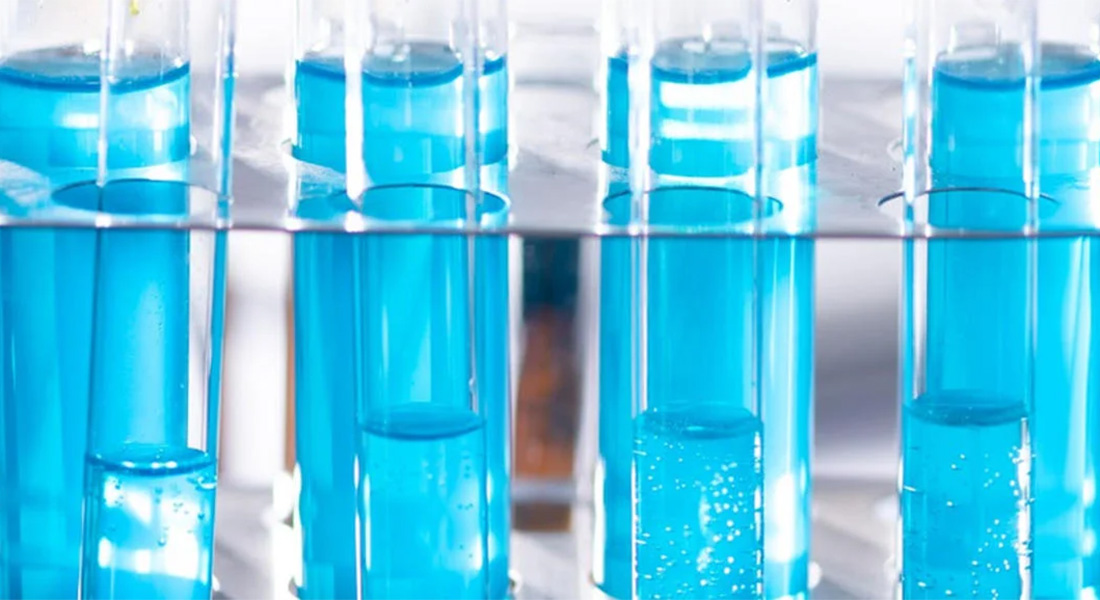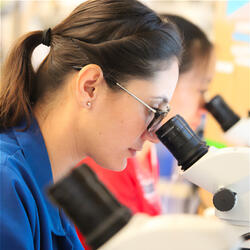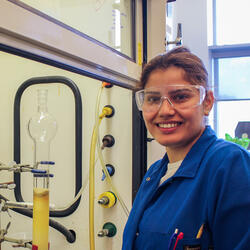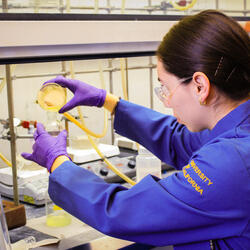Chemistry is the study of matter and its changes, and is typically divided into analytical, environmental, inorganic, materials, organic, and physical disciplines.
What makes Chemistry unique at UCR?
As a freshman, you will be able to take major's general chemistry, and have all your introductory chemistry classes with a class size of ~50, with a close interaction with the class professor.
In general, what are Chemistry professors investigating?
- Understanding chemical and biochemical systems to cure diseases
- Obtaining perfect energy efficiency in reactions
- Determining the connection between chemistry and human aging
- Creating mimics of natural enzymes with synthetic molecules
- Exploring new sustainable catalysts for challenging bond formations
- Determining enzyme mechanisms at the atomic level
Why Chemistry at UCR?
Many Chemistry majors are engaged in research, some as early as their freshman year. These students work side by side with faculty, postdoctoral researchers, and graduate students on exciting projects at the cutting edge of modern chemistry.
Chemistry research at UCR
- Chemical recycling of plastic waste
- Interdisciplinary research such as using physics to solve chemical problems such as molecular binding
- Using mass spectrometry to determine protein structure and function
- Creation of new catalysts
- Using synthetic molecules to sense a wide array of biorelevant targets
- Molecular imaging
What industries can I get into with a Chemistry degree?
- A Chemistry degree prepares you for graduate work in chemistry, or for medical, dental, or pharmacy school
- Chemists work in the petrochemical, pharmaceutical, food/beverage and biotech industries, among others
- You can also work in the public sector, focusing on air and water quality, forensics, and drug analysis
- Outside the laboratory in sales
- Science writing
- Teaching (high school, community college, 4-year university)
- Patent law
What can I do with a Chemistry degree?
Students go into graduate schools in Chemistry and Biochemistry, or medical, dental, pharmacy, or optometry schools. They have taken jobs in molecular-related industries, such as petrochemical, pharmaceutical and biotech, cosmetic chemistry and personal care science. Other possibilities include environmental sciences, such as air and water quality analysis or forensics. Non-laboratory professions include science writing, teaching (high school, community college, 4-year university), and patent law.
What you should know
Do you like working in a laboratory? Chemistry is a highly lab-driven major.
Advice for success
Seek out faculty and show interest in laboratory research from an early age – the more time you have to dedicate to research during your undergraduate career, the more rewarding it will be.
Consider this
The Chemistry Department offers B.S. degrees in: Chemistry, Chemistry and Chemical Physics, Chemistry and Environmental Chemistry, and Chemistry with Education Focus. All degrees in the chemistry department meet the requirements for certification by the American Chemical Society. The department also offers a B.A. degree, which meets the requirements for such areas as pre-medical, pre-dental or pre-pharmaceutical science and education.
Available Minor in Chemistry
Chemistry Minor




